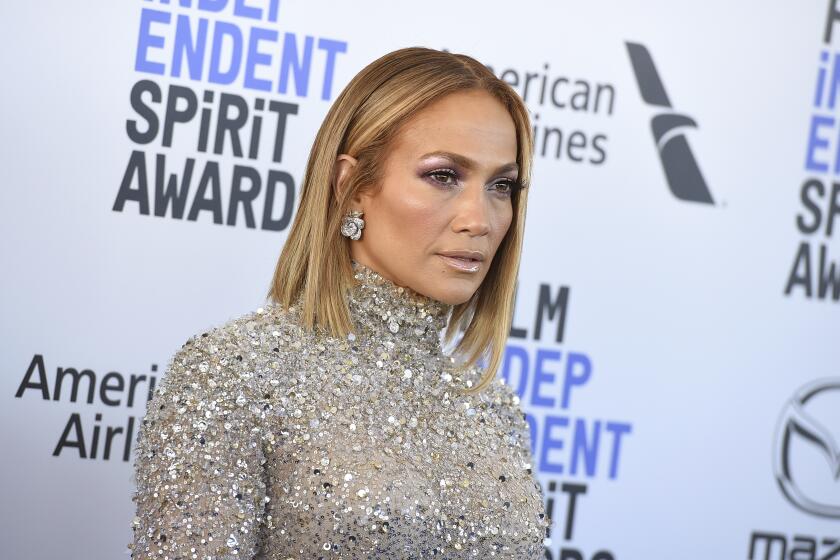WGA Moves to Resolve Concerns
- Share via
Bedeviled by unexpected plot twists, the union representing Hollywood TV and film scribes is trying to write an ending to its leadership problems as studio contract talks near.
The board of the Writers Guild of America, West, is scheduled to meet today to discuss complaints that it mishandled the removal of Victoria Riskin as guild president this month. Riskin resigned after an independent hearing officer ruled that she hadn’t done enough writing to be eligible to run for reelection in September.
The board also is expected to discuss with the new president, Charles Holland, a recent article in which The Times said it found public records that were at odds with his assertions that he served as an elite Green Beret military intelligence officer and attended college on a football scholarship.
Directors contacted by The Times said the board wanted to support Holland, but added that he needed to adequately explain to them and to WGA members the discrepancies between records and his statements about his background.
“Whether he is telling the truth or not, my own feeling is I will respect what he has to say to us about it,” board member Lisa Seidman said.
Seidman added that she isn’t especially bothered by the discrepancies: “We’re storytellers. It’s what we do for a living.”
Also on the agenda for the meeting today is a set of demands from Ron Parker, a guild member who filed the protest that led to Riskin’s removal, and Eric Hughes, the candidate who was defeated by Riskin last September.
Parker and Huges said they had been invited by a guild attorney to submit their demands to the board. They said Sunday that they would demand several reforms, and would ask directors to consider scheduling a new election in which nominees would be designated by the membership rather than by the board.
They also want:
* The opening of board meetings to the members, and circulation of minutes of those meetings within the guild.
* Steps taken to enhance communication among guild members, including the publication of a membership directory, which was dropped five years ago.
* The establishment of a committee independent of the board to review the guild constitution and determine whether it conforms to federal labor law.
* A discussion about whether disciplinary steps should be taken against Riskin and others if they were found to have violated guild rules in setting up a work assignment that they mistakenly believed would qualify her to run in the last election.
Hughes said he and Parker would ask federal regulators to intervene if the board did not come back with what they viewed as a substantive response. “We would go to the Department of Labor,” Hughes said.
Cheryl Rhoden, assistant executive director of the guild, said: “I am sure the board will seriously consider these requests.”
Rhoden added that some of the Hughes-Parker proposals were either reflected in current guild practice or would be realized under changes already contemplated. She said, for instance, that board minutes were available to members who requested them and that meetings, other than their confidential portions, were open to the membership.
Rhoden said the guild was working to make a membership directory available online and that substantial membership information already was available through various Internet services that receive data from the guild.
“I doubt seriously if the board would have a problem with appointing a committee to review the constitution again,” Rhoden said. She said it had conducted such a review in the past, while guild attorneys provided periodic updates on changes in the law.
Regarding the request for direct membership nominations in a new election, Rhoden said the guild constitution provided for selection of candidates both by nominating committee and member petition.
“The board is bound by the constitution,” she said. She declined to comment regarding the request for disciplinary steps.
As for Holland’s future, board member Peter Lefcourt said he didn’t care about the questions on the new president’s background.
“It doesn’t involve malfeasance in office,” Lefcourt said. “He didn’t campaign on being in Special Forces or being a football player.”
But another director, who asked not be named, expressed concern about the revelations, adding that they might prove problematic if Holland did not address the questions in detail because it could hurt the credibility of both the WGA and Holland.
Some members, often through e-mails and on the Internet, are expressing anger at the guild itself for promoting Holland’s background.
A lengthy 2002 article in the guild’s in-house magazine titled “Soldier of Fortune” quoted Holland as saying he had served in Special Forces based at Fort Bragg, N.C., and that “I was in places where people feared a knock on the door, and you couldn’t walk outside without fearing snipers.”
The article was removed from the guild website after The Times raised questions about Holland’s military and athletic statements.
WGA materials mailed to members for the September election, in which Holland was elected vice president, included a full-page endorsement -- signed by such well-known writers as Steven Bochco -- that mentioned Holland as being a former Green Beret.
In addition, such prominent former WGA presidents as Daniel Petrie Jr. and John Wells cited Holland’s military record as a major plus after Holland was named to succeed Riskin.
A Times review of records provided by the military under the Freedom of Information Act show that he served in the National Guard in Illinois and Massachusetts two decades ago while attending graduate school at the University of Illinois and Harvard Law School.
The Times found no record of his serving with the Army’s Special Forces group. In addition, the Special Forces Assn., a group of former members, last week told The Times that it also could find no record of Holland ever serving after researching the topic.
Holland, 44, told The Times that his records about being in Special Forces are classified and that to release them would require committing a felony. A Special Forces spokesman said if Holland served with the unit, his records should reflect it.
The Times also found no records verifying Holland statements that he attended college on a football scholarship at the University of Illinois, where he graduated with a bachelor’s degree in 1980 and a master’s in 1981. Holland told The Times he played wide receiver at the school under a different name, which he provided under the condition that it not be printed.
The university subsequently confirmed that a wide receiver by that name played at the school then. The Times located the player, who serves on a university athletic board of directors, living in Arizona, where he works as an account executive for a pharmaceutical firm. In an interview, the former player said he did not know Holland.
According to Hollywood studio and labor sources, the guild’s ongoing leadership debate may delay getting studios to sit down and bargain with the WGA.
“It certainly doesn’t help,” one top studio executive said.
Studio executives already are pushing to negotiate first with the Screen Actors Guild and the American Federation of Television and Radio Artists, even though contracts with those unions expire June 30, nearly two months after the WGA contract expires May 2.
They principal reason, sources say, is that a walkout by actors, unlike a writers’ strike, would shut production immediately. Studio and Hollywood labor sources said companies also wanted to negotiate first with actors because studios were more at odds with writers over whether companies should share a bigger slice of DVD revenues, suggesting that talks would be more difficult.
Sources said studios were likely to start formal bargaining with actors in the first week of February, and hoped to delay negotiating with writers until after a pact with actors was reached.
More to Read
The biggest entertainment stories
Get our big stories about Hollywood, film, television, music, arts, culture and more right in your inbox as soon as they publish.
You may occasionally receive promotional content from the Los Angeles Times.










